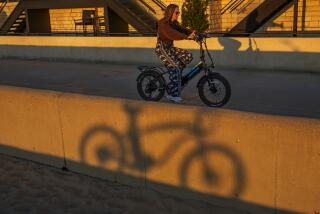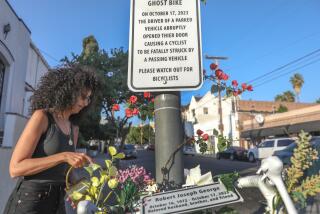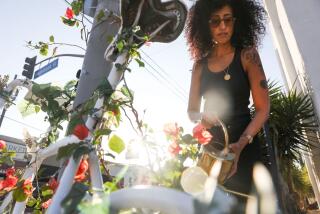Where drive-throughs are pedal-throughs
- Share via
PORTLAND, ORE. — A few weeks ago, Sarah Gilbert, a Portland native who is proudly “car-free,” pedaled her bicycle to the drive-through at Burgerville, a regional fast-food chain. She ordered four cheeseburgers, one each for her husband and three young sons, who were waiting hungrily at home.
But when Gilbert tried to pay for the food, she was denied. This Burgerville drive-through, an employee told her, did not serve bicyclists.
Gilbert was stunned. How could that happen in Portland, the self-proclaimed bike capital of America, where nearly 8% of people pedal to work?
Gilbert, a freelance blogger with thousands of online followers, went home and Twittered huffily about the experience (“burgerville on 26th/ powell turned me on my bike away from drivethrough. and not nicely at all.”), and penned an open letter to Burgerville calling for more bike-friendly policies.
Portland’s bicycle advocates, who are well-connected by a network of e-mail listservs and websites, soon rallied to the cause. They posted their own stories of Burgerville and other drive-throughs that frequently turn bicyclists away.
Many chain restaurants across America do not serve bicyclists at their drive-throughs, said Jeff Mapes, a Portland journalist who has written a book about bike culture. “In a lot of cities it doesn’t make much of a splash at all,” he said. “But here, it’s a cause celebre.”
Portland cyclists know the value of staying in a pack.
In the 1990s, activists lobbied the city to provide bicyclists basic safety measures -- like bike lanes -- and to enact penalties for car drivers who ignore them. Today, Portland boasts one of the most evolved systems of bicycle paths in the country, and has won the highest safety designation from the League of American Bicyclists.
Portland bicyclists “have bureaucratic and infrastructural acceptance, but now people are starting to expect a commensurate cultural acceptance as well,” said Jonathan Maus, who publishes a blog called bikeportland.org. “They expect a business to treat them the same whether they come in a car or on a bike.”
Advocates have successfully persuaded many local businesses to include bicycle parking, he said. Persuading banks, pharmacies, fast-food chains and other businesses with drive-throughs to serve bicyclists is the next step.
Which is why Gilbert’s complaints struck a nerve. There was talk of a boycott. The story was picked up by local news outlets. Finally, Burgerville yielded. The chain apologized to Gilbert (it said it had no formal policy dictating how -- or where -- bicyclists could be served) and announced that it would henceforth welcome cyclists at all of its 39 drive-through locations in Oregon and Washington.
“It’s a strange victory,” Gilbert said. “But it’s a victory.”
One recent sunny afternoon, Gilbert went back to the Burgerville where her crusade began. She turned into the drive-through on a green bicycle, which was plastered with stickers that read “One Less Minivan” and “Make Soup Not War.”
Because bicycles don’t trigger Burgerville’s drive-through sensors, Gilbert had to pedal up to the pick-up window to order. As part of its new “bike-friendly plan,” Burgerville promises that it will post signs instructing bicyclists where to order as well as signs alerting car drivers to the presence of bikes.
A minute later, a woman handed her a greasy sack of Walla Walla sweet onion rings. She smiled and said, “Now you have a wonderful day!”
--
More to Read
Sign up for Essential California
The most important California stories and recommendations in your inbox every morning.
You may occasionally receive promotional content from the Los Angeles Times.














